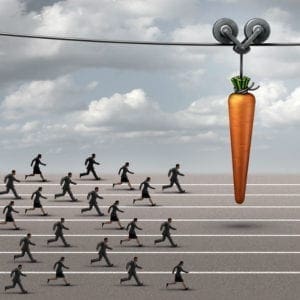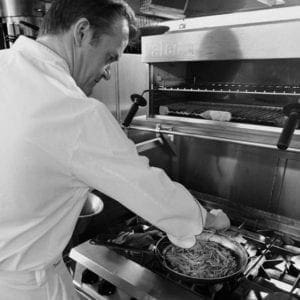
 The philosopher’s stone for hospitality professionals is guest satisfaction, which in profane terms means turning tired, stressed-out, grumpy travelers with great expectations into returning loyal guests. In other words, making our guests happy. Is my guest happy? For some, it can be a riddle as scary as the Sphinx’s.
The philosopher’s stone for hospitality professionals is guest satisfaction, which in profane terms means turning tired, stressed-out, grumpy travelers with great expectations into returning loyal guests. In other words, making our guests happy. Is my guest happy? For some, it can be a riddle as scary as the Sphinx’s.
Fortunately, the elusive and subjective state of happiness has been all the craze in psychology and medical research over the past decades. Surprisingly, there is a lot to learn for curious hoteliers from a medical school text such as the Williams Textbook of Endocrinology. Our guests, like our staff, are made of cells some of which “are designed to efficiently synthesize hormones and secrete them in a regulated way”.
We know that such hormones released in bloodstream can affect mood, happiness or even delight – why not aim high – hence satisfaction and loyalty. We know how, and we also know which stimuli trigger the secretion of some of these powerful chemical signals. Medical research can help us not only answer the Sphinx’s riddle, but also influence the Sphinx.
Customer satisfaction? It’s in the blood… and in the spit
Hormones levels can be measured through a generally accepted technique called salivary testing. No need however for hoteliers to start dipping swabs in traveler’s mouths, nor for front office interns to start collecting test tubes of guests’ saliva samples. As a matter of fact, we could. For our guests’ saliva contains potentially more information about their true level of happiness than the answers they scribbled on a guest satisfaction survey, which most didn’t fill out anyway.
The fundamental rationale is that hoteliers, should work on creating stimuli influencing the release of certain hormones in the blood of guests. The purpose here is not to list the glands, the various hormones, and the receptors but rather to list a few cost-effective and powerful actions we can take in our everyday practice. We spend too much money on expensive amenities or services that cause very little endocrine response, and we ignore simple ways that work, albeit at levels we are unaware of. Certain hormones, while improving mood, also affect our guests’ behavior, making them, for example, less anxious and therefore easier to attend to and relate with.
Some of the actions below are more adapted to boutique hotels than others. Effectiveness may vary depending on the genetic background of guests and their culture. But regardless, all our guests have a pituitary gland and a thyroid. And importantly, most of what follows is very difficult for Airbnb or Homeaway to achieve. Most of these actions can only be performed by hoteliers in hotels. If we implemented these simple, inexpensive and powerful tricks, we could gain a unique and decisive competitive edge over short-term apartment rental (STAR) platforms. We could increase customer loyalty without any loyalty programs. Introducing endocrinology in service design is a win-win for our guests and ourselves. Hotels could become effective and priceless natural antidepressants. Here’s how…
Name and value
Know your guests names and call them by their names to give them importance and show you value them. This works also for your staff. And indeed, your staff’s hormones can influence your guest’s hormones. As a manager, show your staff that you value them beyond performance indicators. Prove you understand that performance is about human stories and not numbers: encourage work in progress, reward efforts made to contribute to your hotel’s vision. Tell your staff “You are awesome”, regardless of what the spreadsheet says. A happy staff will naturally communicate and share happiness with guests, which in turn can trigger endocrine responses in your guests.
Be a faithful listener
Try and bond with returning guests. Show you are as faithful as they are. “Mr. Doe, we reserved for you the room you stayed in last time, which you said you loved.” If they want to try another room, no problem, you have shown faithfulness, which triggers hormone release.
Make time to listen to your guests. Ask them “what’s your story?” Invite them to retell successful moments of their lives.
Offer lifestyle and comedy
Redesign your lobby to facilitate social interaction between guests. The “lifestyle” lobby is not a fad. One of the reasons why customers like Ace hotels is also because lifestyle works at the endocrine level. Offer sitting space outside which improves synthesis in the skin of vitamin D (which is actually a hormone).
Put up signs that say “comedy” in the rooms, publicize the latest comedy movies or series on pay TV, or advertise the coming stand-up comedy shows in town in your elevator. The thought of laughter, the mere expectation of fun, influences hormones secretions. You need not be a funny guy yourself, nor engage in the risky business of telling jokes. However, you could hire a comic performer for guests’ children. Happy children influence parents. If your guests smile, hormone levels are rising.
Wake up and smell the lavender
Lavender smell, used by midwives to reduce anxiety and pain through hormonal secretions is also effective to reduce stress in males. A must for business hotels.
Challenge, exercise and celebrate
Not everything should be taken for granted. Booking a table at your restaurant is not guaranteed.… Tell them you are trying your best and call them back with good news.
Encourage guests to exercise, offer free gym access and promote exercise on the premises.
Challenge your guests, offer victory and celebrate. For example, challenge your guests to eat five fruits and vegetables a day and offer to renew the basket automatically if they do; challenge them to drink more water, and offer bottles, challenge them to exercise in the morning and congratulate them….
Give and touch, but not too much!
They say 5 fruits and vegetables a day, add 5 hugs to the list. Physical interaction is a powerful hormone release stimulus. While it is not a good idea for staff to engage in hugging guests, and while it may seem weird to offer free hugs in the lobby – why not, after all – you may still shake hands, a simple but effective physical interaction.
Give, give, give and you shall receive. In those proportions. Put guests on your side and trigger hormone release with free birthday cake, free hot drinks, free ice-cream for children and grown-ups, free treats.
However, be careful with treating your guests with too much sugar and alcohol. Not only are hormones secretions affected by nutrition, but certain foods could also potentially ruin your entire quest for customer satisfaction. Breakfast and dinner at the hotel restaurant and customer satisfaction are connected in more ways than we think. Instead of sweets at the end of dinner, offer your guests non salty almonds with bitter dark chocolate. Offer whole-wheat bread for dinner and breakfast. The wrong diet can disrupt the mood and affect sleep quality, which no hotelier wants. On the contrary, a dinner of red and green vegetables, tomatoes and spinach, broccoli and peppers, with fish – not fried – salad , olive oil dressing, and no glutamate taste enhancers can contribute to making your guests happier.
12 simple inexpensive actions such as promoting exercise and comedy, giving treats or offering outside sitting space can influence our guests’ mood by changing the level of hormones in their bloodstream. These actions inspired by endocrinology, when combined, could create a unique experience for guests which would work as a soft and natural antidepressant, a feat no short term apartment rental platform can ever achieve. Hoteliers can give travelers a good reason to choose hotels over Airbnb and maybe… become addictive?
About the author
Igor Sekulic is currently Business communication Senior Lecturer at Ecole Hôtelière de Lausanne, with 20 years expertise in the entertainment and event industry.
Professeur agrege de l’Universite in social sciences, former student of the Ecole Normale Superieure, his research focuses on social sciences and popular culture. He taught in Nantes University, France, Cesar Ritz Hotel School, Switzerland as well as in the Washington State University Bachelor in Hospitality management program in Switzerland. He served 8 years as manager of the Montreux Jazz Festival management office. He is also the co-founder of Film Export UK the UK film export body representing British cinema at all film markets worldwide, and creator of the London screenings. He is also the producer of several feature films released internationally, among which the sequel to the French box office hit Les Visiteurs.















